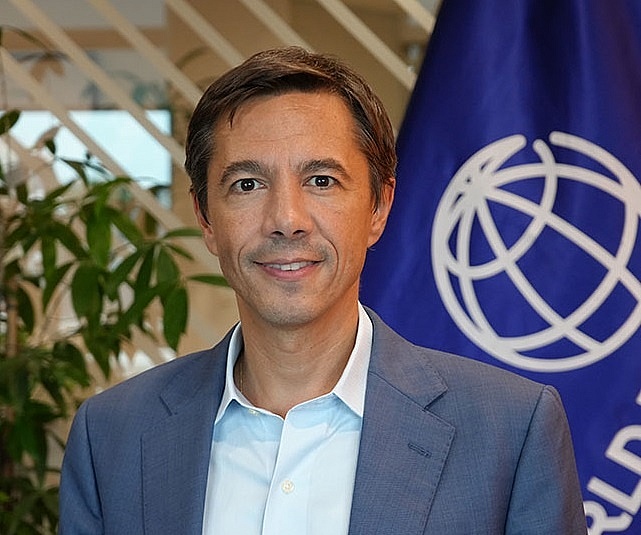The state of play for Vietnam’s economy into 2024
How do you assess Vietnam’s economic performance in 2023?
 |
| Andrea Coppola, lead economist for the World Bank in Vietnam |
The global economic slowdown and its impact on the demand for Vietnamese exports made 2023 one of the most challenging years of the 21st century, after the very difficult pandemic years of 2020 and 2021, but despite these challenges, a gradual recovery is ongoing.
Vietnam is considered one of the most open economies in the world. Its strong trade relations with the rest of the world are a source of strength and success. At the same time, the reliance on demand from trade partners heavily exposed Vietnam to the global economic slowdown experienced in 2023.
As a result, after the very difficult 2020 and 2021 pandemic years, economic performance in 2023 was the least strong since the period following the Asian financial crisis at the end of the 1990s. However, I still consider Vietnam’s economic performance in 2023 to be positive considering the very challenging global context.
Economic growth in the United States was about 2.5 per cent in 2023. In the Euro area, economic growth was even weaker at about 0.5 per cent. Despite the global challenges, Vietnam was able to continue growing at relatively fast rates.
Authorities were capable of increasing public investments by about 35 per cent on the previous year to sustain economic growth. While these are impressive results, challenges remain, including in improving public investment execution, which is becoming increasingly important for the future growth of Vietnam.
Many Vietnamese businesses experienced difficulties last year. Can you explain the causes?
There are two main causes. The first is associated with external factors. The global economic slowdown had a strong impact on demand for Vietnamese exports. This external shock affected so many firms in the manufacturing sectors that focus their business on the production of goods to be exported.
Many workers in the manufacturing sector, which is so important for the Vietnamese economy, lost their jobs and saw their incomes affected. This brings us to the second cause, which is associated with domestic factors. The challenging situation experienced by many Vietnamese workers led to a deceleration of domestic consumption, which affected not only firms in the manufacturing sector but also many other businesses, including other sectors of the economy.
What made the international community notice Vietnam in 2023?
Given the features of the Vietnamese economy, the global economic slowdown has been a large negative shock for the country, but Vietnam was still able to sustain a rate of growth that many other countries in the rest of the world can only dream about.
Vietnam raised attention in 2023. Media outlets with global reach have published articles to underscore Vietnam’s performance and potential, and the visits of world leaders to Vietnam attracted even more attention from the international community.
The country was praised as an appealing destination for international investors because of its economic and political stability and its capacity to integrate in the global economy. I recall an article published by the Financial Times in July pointing to the opportunities for the Vietnamese economy and that Vietnam’s economic moment is now.
In such a context, it is critical for Vietnam to continue strengthening the business environment and engage private investors’ attention to fully take advantage of the impact of global geopolitical developments on international investment and trade.
In 2023, although GDP growth did not meet its set target, the country still did remarkably well in light of tough conditions. What will be the context for 2024?
The international context is expected to remain challenging in 2024. After the global slowdown experienced in 2023, global economic growth is expected to decelerate further in 2024, including in key trade partners for Vietnam such as the United States. The expected weak performance is the result of the lagged and ongoing effects of tight monetary policy, restrictive credit conditions, and weakening global trade. Downside risks predominate, including geopolitical risks, the impact of conflicts on energy prices, financial stress associated with the increase in long-term yields, and weaker than expected activity in China.
In such a context, it would be important for Vietnam to reduce its vulnerability to external shocks and increasingly leverage its internal strength and domestic productivity to support economic growth.
Do you think a GDP growth target of 6-6.5 per cent is achievable?
Given that global economic growth is expected to continue slowing in 2024, that the GDP growth target between 6-6.5 per cent for 2024 is ambitious. Despite the global slowdown, demand for Vietnamese exports could gradually improve, and we project economic growth to slightly accelerate, but it will be challenging to reach 6 or 6.5 per cent unless domestic demand, consumption and investment accelerate further. Authorities can play an important role in supporting the economy though fiscal policy, particularly by accelerating the implementation of transformational public investment and infrastructure projects, which are going to strengthen economic growth both in the short- and longer term.
What strengths do we have in Vietnam to promote growth in 2024 and what recommendations do you have to remove barriers hindering economic development?
The Vietnamese people are the country’s greatest source of the country’s internal strength. Vietnamese workers and entrepreneurs allowed the Vietnamese economy to grow seven-fold during the last 30 years. To sustain this fast growth, also considering the challenging external environment, my suggestion is to continue promoting private sector development and boosting productivity.
Vietnamese authorities can play a key role in helping the country achieve this objective, and I suggest doubling efforts on human capital development by upskilling the labour force and physical capital development through public investments in transport and energy infrastructure, which will further strengthen the competitiveness of the Vietnamese private sector.
 | Vietnam's manufacturing expected to grow in 2024 Thanks to hopes for a recovery in demand both domestically and in export markets, plus business expansion plans, manufacturing is forecast to increase this year, according to S&P Global. |
 | A strategy fit for success to ensure 2024 targets are met Vietnam’s economy grew at a lower-than-expected rate in 2023. Shantanu Chakraborty, Vietnam country director for the Asian Development Bank, talked with VIR’s Thanh Tung about how the economy has performed and key impetuses for the next 12 months. |
What the stars mean:
★ Poor ★ ★ Promising ★★★ Good ★★★★ Very good ★★★★★ Exceptional
Related Contents
Latest News
More News
- Leaders must rediscover discipline of engagement (January 22, 2026 | 11:08)
- IP alterations shape asset strategies for local investors (January 22, 2026 | 10:00)
- 14th National Party Congress: Vietnam - positive factor for peace, sustainable development (January 22, 2026 | 09:46)
- Japanese legislator confident in CPV's role in advancing Vietnam’s growth (January 22, 2026 | 09:30)
- 14th National Party Congress: France-based scholar singles out institutional reform as key breakthrough (January 21, 2026 | 09:59)
- 14th National Party Congress: Promoting OV's role in driving sustainable development (January 20, 2026 | 09:31)
- 14th National Party Congress affirms Party’s leadership role, Vietnam’s right to self-determined development (January 20, 2026 | 09:27)
- Direction ahead for low-carbon development finance in Vietnam (January 14, 2026 | 09:58)
- Vietnam opens arms wide to talent with high-tech nous (December 23, 2025 | 09:00)
- Why global standards matter in digital world (December 18, 2025 | 15:42)

 Tag:
Tag:




















 Mobile Version
Mobile Version